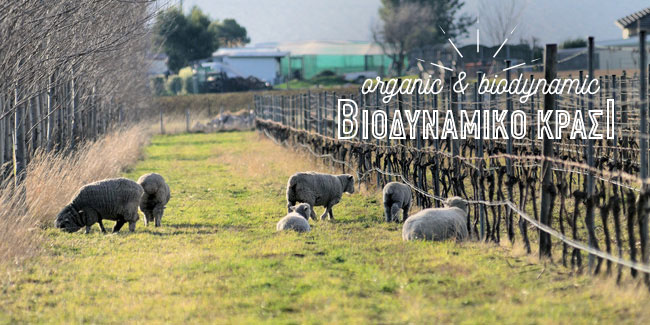WHAT BIODYNAMIC WINE IS?

We often hear about biodynamic wines, biodynamic cultivation and stories about horns and full moons.
1) What biodynamic vinification is?
Biodynamic winemaking adopts a holistic approach to agriculture, based on the observation of the course of celestial bodies (the moon, the planets and the stars). All biodynamic farming practices take place according to the lunar cycle, following the belief that some days are better for some agricultural work and rituals than others and that their realization at the right time yields better results. There are also nine different formulations used as fertilizer to make a wine biodynamic, including cow horn burial!
Biodynamic cultivation encourages biodiversity in the vineyard. In a biodynamic vineyard you will find an increased presence of animals such as cows or sheep, as well as a wide range of plants and insects. Their philosophy follows the principle of "the circle of life" and although it may sound a bit obsolete, some of the best and most famous wine producers in the world have been fanatical for centuries!
2) What is the difference between biodynamic and organic cultivation?
Biodynamic vinification goes a step further than the organic one with regard to vine cultivation. In addition to avoiding pesticides and chemicals in the vineyard, biodynamic producers use natural herbal formulations to enhance soil and vine.
In biodynamic agriculture, the vine is considered to be a self-sufficient, self-sustaining living entity, as isolated as possible from the surrounding environment. All vines are involved, each in its own way in the development and completion of the development of the vineyard.
3) Is it healthier? What are the benefits?
Biodynamic vinification emphasizes to the health of the soil and the environment. The complete lack of pesticides and other chemical formulations, as well as organic wines, has significant health benefits. They tend to express the terroir better by allowing wine to highlight the characteristics of the region's diversity and climate.
4) How do I know if a wine is biodynamic?
The most common certification organization that confirms whether a wine is biodynamic is Demeter International. If a wine is certified by Demeter it will have a small badge on its label. However, most biodynamic wines are not certified because both the bureaucratic process and the high cost discourage producers.
5) Where can I buy biodynamic wines?
In Greece, those who follow the principles of biodynamic cultivation are relatively limited although the list grows. Among them you will find Domaine Karanikas from Amynteo, Domaine Tatsis from Goumenissa and Domaine Sklavos from Kefalonia, whose wines can be found in the suggestions of botilia.gr. On the Demeter page you can find a detailed list of wineries that have been certified globally.
Angelos Damoulianos
Founder of botilia.gr


